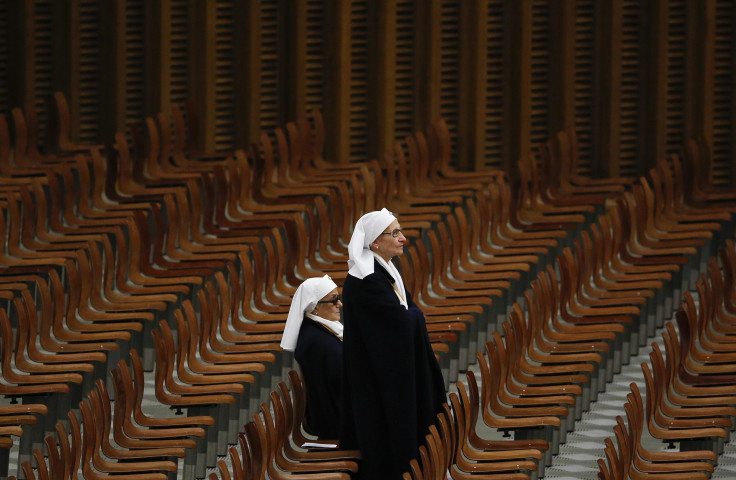American Nuns React To New Vatican Report, Saying It ‘Reflects Our Reality’

American nuns can breathe a sigh of relief. The six-year Vatican investigation into their lives is over, and the findings are not as contentious as they had expected.
The visitation report, released in Rome on Tuesday, adopted a warm, positive tone toward the 50,000 or so women who live in Catholic religious institutions across the United States. When Emeritus Pope Benedict XVI launched the inquiry six years ago, it was met with fear and anger among women who believed the findings would criticize their way of life.
“Sorry, folks, this is not a controversial document,” Mother Clare Millea, an American nun who ran the investigation, said at the news conference Tuesday.
Investigations on religious orders typically take place after a scandal or serious problem is reported. When the inquiry was announced in 2008, the only reason given, as described by Cardinal Rodé, was concerns that American nuns had a “secularist mentality that has spread among these religious families, perhaps even a certain ‘feminist’ spirit.”
The 12-page report fell silent on issues pertaining to the so-called feminist mentality that led to the investigation in the first place. Instead, the findings focused on the dwindling numbers at American convents, their aging populations and the need for "a greater recognition" of the role nuns play in the Catholic Church.
Sister Marcia Allen, president-elect of the Leadership Conference of Women Religious (LCWR), an umbrella group that represents about 80 percent of American nuns, agreed. “This definitely brought religious life for women into the forefront of the church, and that is good,” Allen said in a press conference Tuesday. “The principals in Rome have changed [since the investigation began], and they sound different. The words they use now are ‘collaborate’ and ‘dialogue,’ which give us tools to be part of the conversation.”
According to the report, there are about 50,000 nuns across 341 religious institutions in the U.S. That is a sharp decline from the mid-1960s, when there were 125,000 sisters. Their median age is now in the mid- to late 70s.
Mother Agnes M. Donovan is the chair of the Council of Major Superiors of Women Religious, the other umbrella group that represents nuns in the U.S. Despite their dwindling numbers, Donovan says there is still “reason for hope.”
“Apostolic religious life is not dying in the United States,” she said in a statement on Tuesday. She refers to the fact that nearly 1,000 women from their religious communities are in the discernment phase -- the period before nuns take their final vows.
“There is cause for wonder here, and gratitude,” Donovan said. “Our culture can be quite antagonistic towards the faith and skeptical at best toward religious life, and yet from this milieu the Lord is surprising women with His love, His mercy, and the possibility of a new and beautiful life consecrated by public vows.”
The report included findings from questionnaires sent to religious institutions that were asked about their prayer schedules, living arrangements, financial assets, admission policies and fidelity to their vows. About 80 investigators visited 90 religious communities.
“The report we are receiving today reflects our reality -- in its commonality and diversity,” Sister Sharon Holland from the Servants of the Immaculate Heart of Mary said in a statement. Holland said there was a “certain anxiety in the air” when the investigating nuns visited her community. But once the investigators began to explain their purpose, the tone lightened.
“It was evident that these were sisters like us to whom we could speak openly and honestly. The personal visits took place in open conversation, sharing the joys and hopes of post-conciliar renewal; the anxieties, concerns and hopes for the future,” Holland said.
But not every religious community was cooperative with the investigation. Rather than filling out the questionnaire, some decided to give copies of their original founding documents instead. This was triggered by the belief that the Vatican was determining their financial assets and property value with the intention to appropriate them, the New York Times reports.
The report acknowledged this, saying there was “apprehension and suspicion” among the nuns who participated and that the “the lack of full cooperation was a painful disappointment for us.” Still, the report is being lauded as an "olive branch" to American nuns who have felt scrutinized by the Catholic Church. The investigation is one of two inquiries the Vatican has launched on the lives of American nuns.
The second inquiry, which falls under a separate Vatican department, addressed the LCWR. Vatican officials expressed concern that the LCWR was promoting "radical feminist themes incompatible with the Catholic faith." In 2012 its findings led Pope Benedict XVI to appoint three churchmen to oversee the organization’s major decisions.
The Nuns Justice Project, a Catholic group that is opposed to the mandate the LCWR faces, said the latest report represents a positive “first step” to reconcile with American sisters. Still, the group called the investigation “demeaning and a huge waste of time.”
The resources the Vatican and religious communities spent on the investigation led to a conclusion that “Catholics have known all along,” the group said. “U.S. women religious are among the most inspiring and faithful of Catholics and led the way in implementing Vatican II reforms.”
© Copyright IBTimes 2025. All rights reserved.






















